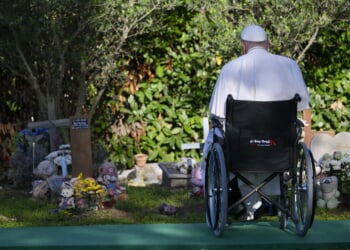Tom Hunt is the former Conservative Member of Parliament for Ipswich and previously a councillor on East Cambridgeshire District Council.
After about two months of scrutiny, including 11 days of line-by-line examination of the Assisted Dying Bill, Kim Leadbeater’s Bill Committee has finally come to an end.
The constant chicanery and game playing by Leadbeater and her supporters throughout this vital stage of the Bill’s journey will likely have done more to alienate MPs than generate support and build consensus.
Genuine attempts have been made by those who opposed the Bill at Second Reading to make the legislation safer and protect vulnerable groups, yet 327 of their amendments aimed at boosting safeguards have been rejected as Leadbeater has sought to railroad her Bill through the committee.
I have followed proceedings closely and could probably write a very depressing book about the shortcomings of the Committee process and Leadbeater’s ‘leadership’ of it, but for the purposes of this piece, I will condense my views to six key ways in which Leadbeater has sought to distort throughout.
The Committee membership.
Nine of the 23 MPs appointed by Leadbeater to her Committee voted against the Bill at Second Reading. This is a lower proportion than compared to MPs who voted against her Bill at Second Reading, but it is not the worst of Leadbeater’s indiscretions.
As I have argued before, the other 14 MPs who supported the Leadbeater Bill were generally more experienced Parliamentarians and had spoken in the Second Reading debate (an indication of interest and expertise). In comparison, the nine MPs who opposed the Bill at second reading were generally greener and, except for Danny Kruger, none spoke during the Second Reading debate.
Despite this attempt by Leadbeater to stack the deck, MPs who could reasonably be described as ‘quiet’ opponents at Second Reading really came into their own and excelled. Rebecca Paul, Sarah Olney and Naz Shah really stand out in this regard.
Bearing in mind the way in which the shortcomings of Leadbeater’s Bill were ruthlessly exposed at Committee, one can only imagine how much worse it could have been for Leadbeater if figures such as Rachel Maskell or Dame Meg Hillier were on the Committee; it would have been carnage.
The witness lists
The commotion and media attention generated by the initial procedural meeting was a sign early on that things were not quite right. These sorts of meetings almost always attract no attention, but Leadbeater’s choice to force the meeting into private session ensured this would not be the case.
There was a clear attempt (largely successful) by Leadbeater to gerrymander the witness lists for oral evidence sessions. Unbelievably, the Royal College of Psychiatrists (RCP) were initially blocked from giving evidence – most likely because the RCP were on record for holding serious concerns about her Bill – before an outcry in the media forced a u-turn.
Ahead of Second Reading, more than 350 disability organisations came out in opposition to the Leadbeater Bill, but not a single one of these organisations was initially invited to give oral evidence. Leadbeater also had to u-turn on this and later invited Fazilet Hadi of Disability Rights UK.
Regarding international witnesses, all eight were known supporters of the principle of assisted suicide/euthanasia. Six of those eight came from Australian states that have introduced such laws only recently and have very little data to draw on. There were no witnesses from Canada, Oregon (on which the Bill is meant to be based) or the Netherlands; very convenient.
Removal of the High Court safeguard
Trumpeted by Leadbeater as being a key safeguard that would make assisted suicide in this country the safest “in the world”, there were 60 MPs who cited the safeguard as being a reason why they voted for the Leadbeater Bill at Second Reading.
But very shortly after the Bill narrowly passed Second Reading, co-sponsor of the Bill Jake Richards started floating the prospect of the safeguard being jettisoned. Understandably, this made many, including me, deeply suspicious.
In February, The Times then ran with a front page story about the prospect of the High Court safeguard being dropped (presumably based on good intelligence), something that was robustly denied by Leadbeater at the time.
On the eve of line-by-line scrutiny, Leadbeater gave an interview to Sky’s Sophy Ridge stating there would be a role for a High Court judge. At 10pm the same night, Leadbeater then published her amendments to remove the High Court safeguard.
MPs on the Committee had been given no forewarning, despite the seismic nature of the change, but the Guardian clearly had and ran a front page exclusive.
The “Judge plus” replacement
The High Court safeguard was replaced by panels that will have to sign off requests for death in place of a High Court judge. Leadbeater referred to this as “judge plus”, even though under the new model it is extremely unlikely a judge will be involved in individual requests for death.
One could be forgiven for suspecting the High Court safeguard was just a ruse to get the Bill past Second Reading.
The Royal College of GPs’ survey (RCGP)
A survey of RCGP members that took place earlier this year demonstrates a clear swing away from support for the principle of assisted suicide. In 2019, 40 per cent of members felt the RCGP should adopt a supportive position towards assisted dying and 47 per cent thought the RCGP should adopt a position of opposition.
The latest survey showed support dropping to 33.7 per cent and opposition growing to 47.6 per cent. The RCGP adopted a position of neutrality towards assisted dying following this because of a new standing that meant if less than 50 per cent support one option RCGP should be neutral.
In classic Leadbeater style, this was spun to MPs in an email last weekend as representing a shift in GP sentiment towards assisted dying when the survey results prove quite the opposite. It really does take astonishing self-confidence, bordering on the comical, to insist so brazenly that growth in opposition – accompanied by a decline in support – means a shift towards backing law change.
The National Centre for Social Research (NCSR) polling
In the same email to MPs, Leadbeater also referenced polling by the National Centre for Social Research as demonstrating ongoing support for assisted dying “following second reading”. Inaccurate.
The field work for the polling in question was carried out between 16 September and 27 October. There have been subsequent calls from MPs for Leadbeater to correct the record. The questions asked as part of this poll also had nothing at all to do with Leadbeater’s actual Bill.
All in all, the picture is not great. I would not say what we saw at Committee represented “Parliament at its best”.


![NYC Tourist Helicopter Falls into Hudson River, Siemens Executive and Family Among Those Killed [WATCH]](https://www.right2024.com/wp-content/uploads/2025/04/NYC-Tourist-Helicopter-Falls-into-Hudson-River-Siemens-Executive-and-350x250.jpg)







![Green Day’s Cringe Trump Diss Ends in Fire and Evacuation [WATCH]](https://www.right2024.com/wp-content/uploads/2025/04/Green-Days-Cringe-Trump-Diss-Ends-in-Fire-and-Evacuation-350x250.jpg)
![Red Sox Fan Makes the ‘Catch of the Day’ with Unconventional ‘Glove’ [WATCH]](https://www.right2024.com/wp-content/uploads/2025/04/Red-Sox-Fan-Makes-the-‘Catch-of-the-Day-with-350x250.jpg)





